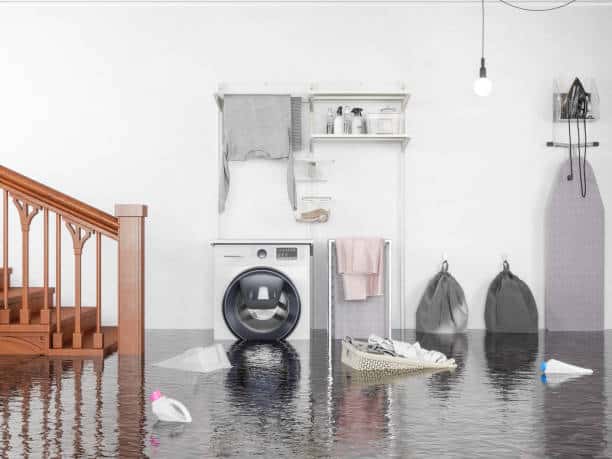Your HVAC system isn’t one of the first things you’d typically think about when preparing for bad weather or flooding, but it is certainly an important appliance to protect. Follow these tips to ensure your heating and cooling system stays safe so it can continue keeping you and your family comfortable after the inclement weather moves on.

Protect Your HVAC From A Flooded Basement And Bad Weather
The Midwest is well known for its temperamental weather patterns so it is always best to be prepared for just about anything. From high winds to severe thunderstorms, harsh weather conditions can cause a lot of harm to your heating and cooling unit. Here are some steps to keep your HVAC system safe during a bout of bad weather.
-
Shut Off Your HVAC System
If you are anticipating bad weather, use your thermostat to turn your heating and cooling system off, then cut the power at the circuit breaker. These steps will help reduce the risk of power surges caused by damaged transformers, lightning strikes, or when the power turns back on after an outage. Consider having a professional install a surge protector at the circuit breaker box for extra surge protection.
-
Cover Your Outdoor Air Conditioning Unit
Having hail guards installed on your outdoor air conditioner can protect against major damage to the fins and refrigerant coil. These guards are made of a thick metal mesh and can stay in place all year since it has no adverse effect on your heating and air conditioning equipment. When bad weather hits, this device will potentially save your from having to spend hundreds or thousands of dollars on a repair or replacement.
-
Remove Damaging Debris
Be sure to remove anything from your yard that could easily be flung by heavy winds such as patio furniture, children’s toys, and tree branches. It’s a good idea to trim any branches that could easily break off and fall during a storm.
-
Protect Wires
Make sure the wires that run between your outdoor HVAC unit and your home are covered and secured to prevent dangerous shorts. Exposure to the sun and temperature changes can even deteriorate well insulated wires so it’s best to keep an eye out for wear and tear throughout the year as well.
-
Have Your Unit Anchored Onto A Concrete Pad
Although this is more of a preventative measure, it is worth noting. Having a tall concrete base created to anchor your unit onto can protect it from flood waters. Be sure to consult with your local trusted HVAC professional for advice on the best height for your base.
Protect Your HVAC System From Flooding
It isn’t unheard of to experience a bit of flooding from time to time in the Chicago area and it’s essential that you protect your heating and cooling system from the damaging water. Here are a few ways to help defend your HVAC system from flooding.
-
Cut The Power
Turn your HVAC system off at the thermostat then cut the power at the circuit breaker. The last thing you want is to have the power on with water flowing into the breaker panel and over the inside electrical controls and components.
-
Move Lawn Items
One of the most common sources of damage to an HVAC unit during flooding is by being struck by outdoor furniture, barbecue grills, and other lawn equipment. Be sure to move these items into a shed or garage (or into your home if necessary) to keep them safe and out of the way.
-
Invest In A Sump Pump and High Water Alarm
Most of your HVAC equipment will be located on the ground floor or basement of your home. Unfortunately when a pipe burst or torrential downpour occurs, everything from your electric or gas furnace, to your water heater and air conditioner could face significant damage.
Investing in a sump pump and high water alarm can offer some protection for your HVAC in a flooded basement. Once enough water is present in your basement to make the components within these devices float, the alarm will sound and the pump will begin draining the water from your basement.
-
Contact Your Insurance Company
Most homeowner policies do not include flood damage. Before a big storm hits, be sure to talk to your local insurance agent about any endorsements you can add to your policy to ensure your property will be covered in case of a flood. Please note, for complete flood insurance, you will want to contact FEMA.
Experience The Deljo Difference
It might be tempting to try one of the latest DIY videos you see online, but when it comes to your HVAC system, it’s best left to the professionals. At Deljo Heating & Cooling, all of our expert HVAC technicians are NATE certified and experienced in a multitude of different heating and cooling systems so you can have peace of mind knowing your unit is being serviced by a seasoned professional.
Whether you find yourself in need of an urgent HVAC repair, looking to schedule your annual maintenance, or considering upgrading to a more efficient heating and cooling system, Deljo is here to assist you with all of your HVAC needs. Give us a call to schedule an appointment with one of our highly trained experts today.

